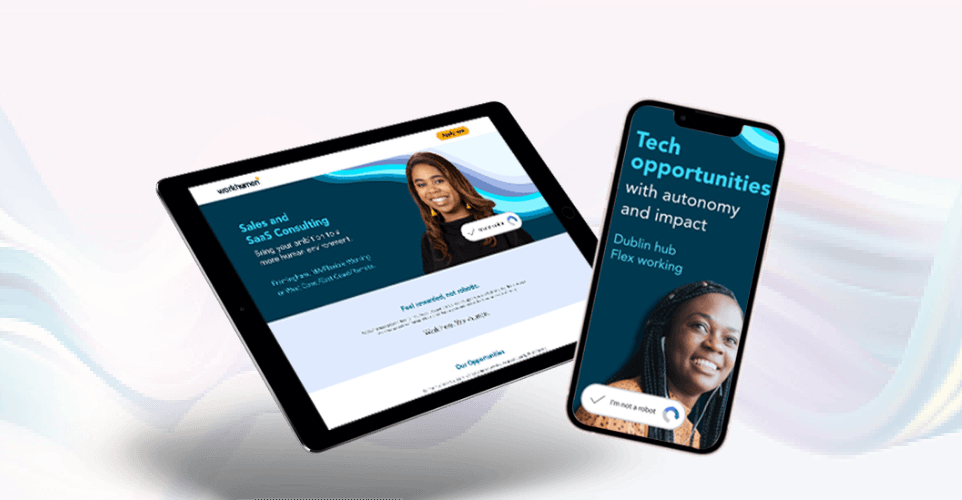Your RPO provider needs to build better solutions, rather than just bolting on more services.
Introduction
Questions around Diversity, Equity, Inclusion and Belonging are at the heart of how organisations are evolving. Post-covid, in the era of remote and hybrid-working, organisations are more likely to be recruiting diverse candidates from a more diverse field – while also experiencing fewer opportunities to bring people together, shape culture and values, and unleash the power of diversity as a real asset for business growth.
For many employers, it feels as though DEIB is more important than ever. Yet at the same time, it equally feels as though it is more difficult than ever to really capitalise on the opportunities a strong commitment to DEIB creates.
The importance of DEIB
It has been well documented that inclusive and diverse organisations are typically more successful. Research by Forbes highlighted that decisions made and executed by diverse teams delivered 60% better results and inclusive teams make better business decisions 87% of the time.
Yet at the same time, DEIB has become a catch-all for many different challenges never typically stay the same. These challenges are affected by industry sector, organisational culture, candidate perceptions – but whether the challenge is to recruit and develop more female leaders, to realise the full potential of Black and minority ethnic workers, or build strong Employee Resource networks or to combat ageism, they all fall under the DEIB banner.
For the majority of organisations, therefore, DEIB is no longer just a policy to state. It is a strategy that needs to be aligned with the needs of the business and integrated into many different areas – not least talent acquisition and recruitment.
”Companies in the top quartile for both gender and ethnic diversity in executive teams are on average 9% more likely to outperform their peers.“ – McKinsey & Company
The Challenge Ahead for the RPO Provider
Traditionally, RPO provision has focused far more on delivery and speed than strategy and solution. That needs to change and, for some of the more forward-thinking practitioners, it already has. We are now firmly in the era of talent solutions and DEIB has to be a key driver in how organisations attract, recruit and onboard candidates from diverse backgrounds.
In an article in 2023, recruitmentmarketing.com highlighted the 5 key pillars of an effective DEIB strategy. The first two pillars focus on talent acquisition, as opposed to engagement and retention, and they should act as a wake-up call to all RPO providers:
Pillar 1: Representing Diversity in Employer Branding
Pillar 2: Recruiting Practices that Remove Barriers for Diverse Talent
For RPO providers, building strategies for inclusivity as well as processes for recruitment has to become second nature. The issues are too pressing and urgent for employers for DEIB to continue to be an afterthought – and RPO providers are, quite frankly, the best-placed partners to help organisations to identify opportunities for change, integrate new approaches and embed new ways of working.
What can an RPO provider do?
The most important step forward for RPO providers is to make the transition to being a talent solutions partner, rather than simply seeing themselves as service providers. This mindset is differentiating the market leaders. It drives a new way of thinking about the traditional RPO service and a new way of thinking about the type of experience that clients and candidates should receive. In a more competitive marketplace, the baseline requirement is to deliver a level of service that goes above and beyond simply bringing numbers in through the door.
Employer Brand
The last decade has seen many RPO providers looking to extend their service offering to include employer branding. The truth is that not every RPO provider totally understands the depth and complexity of how an employer brand is researched, built, activated and managed – and they do not have the resource and expertise required to elevate their service offering.
Representing diversity in your employer brand should be an essential strand in your recruitment strategy and there is no doubt that your RPO provider is well-placed to be the partner that integrates your approach. But if RPO providers want to act as a talent solutions partner with a voice at the table, their appreciation of DEIB, branding and marketing has to show a level of true sophistication.
Talent Marketing
When we are talking about DEIB, it is also important to make the distinction between how your build your brand and then how you take it to market. Candidates consume information across so many different devices, in so many different formats, it is easy to lose track of whether you are consistently presenting yourself in an accessible way. From fonts and colours to the quality of your photography, video and animation, everything can make a difference.
Recruiting Practices that Remove Barriers
Removing biases through the recruitment process is a vital strand in any DEIB strategy – and one where a progressive RPO provider will want to support. Do Hiring Managers need training in unconscious bias? Is the technology you are using inclusive? Have you built an effective onboarding strategy that ensures a great experience for every candidate?
“Around 63% of employees across all generations said they prioritise DEI programs when it comes to choosing which company to work for, while 73% of Gen Z and 68% of Millennial respondents said the same” – EY Global Survey, 2023
Conclusion
The conversation around strategy and solution vs process and implementation is here to stay. Whether that conversation centres around DEIB, AI and new technologies, global skills shortages or economic uncertainty, the message to RPO providers is the same: now is the time to evolve.
DEIB is more than a hot topic. It should be an essential consideration in every recruitment decision and RPO providers should be ready to make that happen.
Some RPO providers have already made the step up, partnering with clients to offer smarter solutions, better experiences and more transparent results, data and ROI. Other RPO providers are perhaps still a little further behind. If so, the sense is that they need to start playing catch-up quick.







